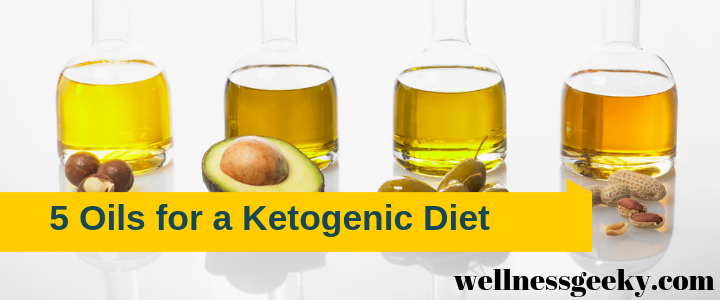
Going on a ketogenic diet is one of the most popular types of dieting. It’s a low-carb, high-fat diet that involves drastically reducing carbohydrate intake and replacing it with fat.
It does wonders to those looking to lose weight, without the burden of tracking their calorie intake. In fact, a study on PubMed found that people on a ketogenic diet lost 2.2 times more weight than those on a calorie-restricted low-fat diet.
One of the best ways to supplement your daily fat intake is by cooking with monounsaturated and saturated fats normally found in specific oils.
Natural oils, in particular, are recommended not only for their health benefits, but their moisturizing, protective, and antibacterial qualities that create smooth, glowing, and healthy-looking skin. Here’s a list of some of these double wonders.
Avocado Oil
Avocado oil has one of the highest monounsaturated fat percentages among all cooking oils, second only to olive oil. It can withstand high cooking temperatures making it perfect for grilling, roasting, or using in salad dressings.
Avocado oil is also rich in polyunsaturated fatty acids that soothe the skin and decrease redness due to UV exposure. However, Live Science notes that avocado oil tends to be more expensive and harder to find – this is why people prefer to use olive oil
Extra Virgin Olive Oil
The average Greek consumes around 20 liters of olive oil a year, and Greeks have an average life expectancy of over 80 years old.
Extra virgin olive oil is made up of 100 percent fat and has similar properties to avocado oil. It has also been found to improve glycemic index and insulin regulation, which helps with weight loss.
Extra virgin olive oil also helps with anti-aging, osteoporosis, and skin damage by adding a protective coating on the skin. It’s naturally high in squalene which functions as a barrier to keep your skin smooth and soft underneath.
Hazelnut Oil
Hazelnuts themselves are rich in vitamin E, B, and oleic acid. Its fatty acid content is similar to avocado and olive oils.
Hazelnut oil is also an excellent carrier oil. Carrier oils are mixed with stronger oils that are too harsh to apply directly onto the skin. Healthy Focus notes that it’s also a type of astringent – one that helps tightens the skin, shrink pores and eradicate bacteria.
Sunflower Oil
Pop Sugar informs that sunflower oil is high in omega-6 which is a good source of fatty acid that’s essential in low-fat diets, as the body can’t produce it.
For those who don’t want to cook with it, they’ve started creating sunflower oil redesigns like NuSun and high oleic sunflower oil that aim to rectify these properties and are more Keto-friendly.
Pretty Me notes how sunflower oil concentrate can act as an anti-inflammatory due its being rich in Vitamin E. It also reduces ache, irritation, and general redness of the skin.
Coconut Oil
Healthline explain how coconut oil helps the skin by being high in antimicrobial properties. This can prevent skin conditions like “acne, cellulitis, folliculitis, and athlete's foot” which are caused by bacteria or fungi.
Coconut oil can also help reduce inflammation by improving the body's antioxidant status. This could help reduce pain for conditions such as contact dermatitis, eczema, and psoriasis.
Is Sunflower Oil Keto-Friendly?
Yes, Sunflower oil is considered keto-friendly. It is a commonly used cooking oil derived from the seeds of sunflowers and is low in carbohydrates, making it suitable for a ketogenic diet. The ketogenic diet relies on a high-fat, low-carbohydrate intake to induce a state of ketosis, where the body uses fat as its primary source of energy.
Sunflower oil contains predominantly unsaturated fats, particularly monounsaturated and polyunsaturated fats, which are beneficial for heart health and can support the goals of a ketogenic diet. It is also rich in vitamin E, an antioxidant that helps protect cells from oxidative damage.
However, it's essential to moderate your overall fat intake while on a ketogenic diet to maintain a proper balance with protein and carbohydrate consumption. Additionally, some sunflower oils may undergo high-heat processing, potentially leading to the formation of harmful compounds. Opt for cold-pressed or unrefined sunflower oil whenever possible to ensure the highest quality.
As with any dietary choice, it's best to consult with a healthcare professional or registered dietitian to tailor your keto diet to your specific needs and health goals.
Is Mustard Oil Keto Friendly?
Yes, Mustard oil can be considered keto-friendly. It is derived from mustard seeds and contains a high proportion of monounsaturated and polyunsaturated fats, making it a suitable choice for a ketogenic diet. The ketogenic diet emphasizes a low-carbohydrate and high-fat intake to promote ketosis, a metabolic state where the body burns fat for energy.
Mustard oil is notably rich in alpha-linolenic acid (ALA), an essential omega-3 fatty acid that supports heart health and has anti-inflammatory properties. Additionally, it provides a good amount of vitamin E, an antioxidant that protects cells from oxidative stress.
However, it's essential to use mustard oil in moderation due to its pungent flavor and strong taste. While it can be a healthy addition to your ketogenic diet, balance your overall fat intake with protein and carbohydrate consumption for optimal results.
As with any dietary choice, it's advisable to consult with a healthcare professional or registered dietitian to customize your keto diet to your individual needs and health status.
Is Canola Oil Keto-Friendly?
Absolutely! Canola oil is definitely keto-friendly. It's derived from canola plant seeds and has a very low carb content, making it an ideal choice for those following a ketogenic diet. The whole idea behind the keto diet is to consume high amounts of healthy fats while minimizing carbohydrate intake, which triggers the body to enter ketosis, where it burns fat for energy.
Canola oil is primarily composed of heart-healthy monounsaturated and polyunsaturated fats, including essential omega-3 and omega-6 fatty acids, which offer numerous health benefits, especially for cardiovascular health and inflammation reduction. Additionally, it has a high smoke point, making it perfect for various cooking methods like frying and sautéing without releasing harmful compounds.
The mild, neutral flavor of canola oil makes it a versatile option in the kitchen, as it won't overpower the taste of your dishes. However, like any oil, it's essential to use it in moderation to maintain a balanced diet, ensuring you still pay attention to your protein and carb intake.
If you have any specific health concerns or dietary questions, it's always wise to consult with a healthcare professional or a registered dietitian, who can guide you on tailoring your ketogenic diet to suit your individual needs and goals.




